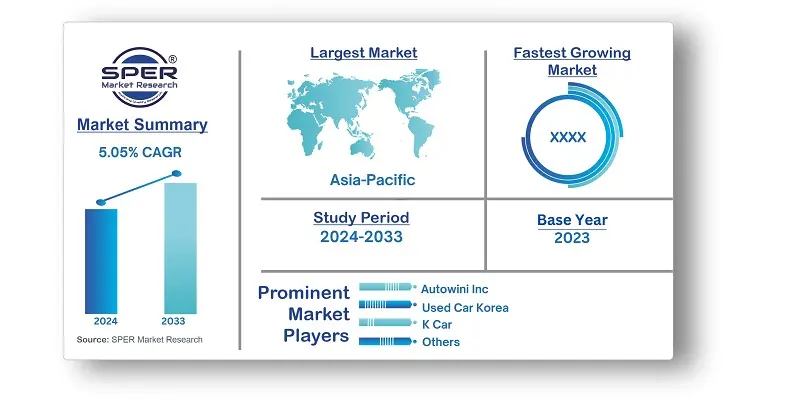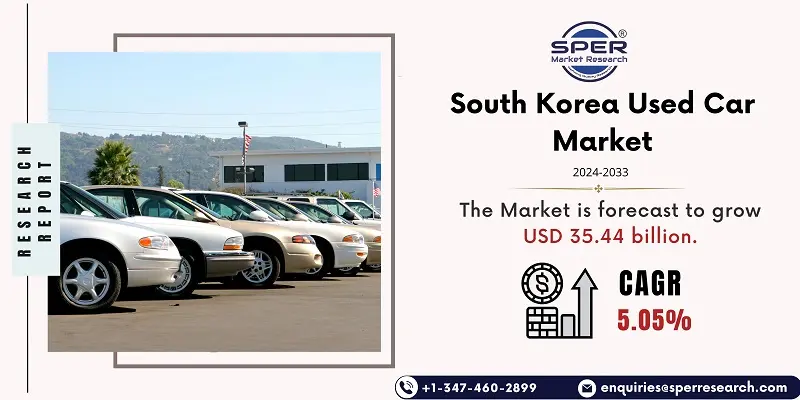
South Korea Used Car Market Growth, Size, Trends, Share, Revenue, Demand and Future Outlook
South Korea Used Car Market Size– By Vehicle Type, By Vendor Type, By Fuel Type, By Sales Channel- Regional Outlook, Competitive Strategies and Segment Forecast to 2033
| Published: Jul-2024 | Report ID: AMIN24172 | Pages: 1 - 103 | Formats*: |
| Category : Automotive & Transportation | |||
- February 2023: The Korean International Trade Association (KITA) published a report indicating that South Korea's used vehicle exports to Russia increased by 1,163% in 2022 as new car releases were prohibited due to the ongoing conflict in Ukraine. Additionally, the organisation reported that, with 19,626 used cars shipped in 2022, Russia represented 4.9% of all foreign used car shipments from South Korea.
- August 2022: Han Sung Motor opened its largest service centre in South Korea, combining the Yongdap and Seongdong Service Centres for Mercedes-Benz customers. The new facility will offer auto repair services for both used and new Mercedes-Benz vehicles around the country.


| Report Metric | Details |
| Market size available for years | 2020-2033 |
| Base year considered | 2023 |
| Forecast period | 2024-2033 |
| Segments covered | By Vehicle Type, By Vendor Type, By Fuel Type, By Sales Channel |
| Regions covered | Seoul Capital Area, Yeongnam (Southeastern Region), Honam (Southwestern Region), Hoseo (Central Region) |
| Companies Covered | Autowini Inc, Robert's Used Car, KB Cha Cha Cha, K Car, Encar, Used Car Korea, Sena Trading, Car Vision, Be Forward, PicknBuy24, Han Sung Motor, Aj Sell Car, Pickplus, Hyundai Glovis, Corea-Auto. |
- Individual Consumers
- Used Car Dealerships
- Automobile Auction Houses
- Online Car Marketplaces
- Financial Institutions
- Vehicle Inspection and Certification Services
- Automobile Service Centers and Garages
- Car Rental Companies
- Insurance Companies
- Government and Regulatory Bodies
| By Vehicle Type: |
|
| By Vendor Type: |
|
| By Fuel Type: |
|
| By Sales Channel: |
|
- South Korea Used Car Market Size (FY’2024-FY’2033)
- Overview of South Korea Used Car Market
- Segmentation of South Korea Used Car Market By Vehicle Type (Hatchbacks, Sedans, Sports Utility Vehicles/Multi-Purpose Vehicles)
- Segmentation of South Korea Used Car Market By Vendor Type (Organized, Unorganized)
- Segmentation of South Korea Used Car Market By Fuel Type (Petrol, Diesel, Electric, Other Fuel Types)
- Segmentation of South Korea Used Car Market By Sales Channel (Online, Offline)
- Statistical Snap of South Korea Used Car Market
- Expansion Analysis of South Korea Used Car Market
- Problems and Obstacles in South Korea Used Car Market
- Competitive Landscape in the South Korea Used Car Market
- Impact of COVID-19 and Demonetization on South Korea Used Car Market
- Details on Current Investment in South Korea Used Car Market
- Competitive Analysis of South Korea Used Car Market
- Prominent Players in the South Korea Used Car Market
- SWOT Analysis of South Korea Used Car Market
- South Korea Used Car Market Future Outlook and Projections (FY’2024-FY’2033)
- Recommendations from Analyst
1.1. Scope of the report1.2. Market segment analysis
2.1. Research data source2.1.1. Secondary Data2.1.2. Primary Data2.1.3. SPER’s internal database2.1.4. Premium insight from KOL’s2.2. Market size estimation2.2.1. Top-down and Bottom-up approach2.3. Data triangulation
4.1. Driver, Restraint, Opportunity and Challenges analysis4.1.1. Drivers4.1.2. Restraints4.1.3. Opportunities4.1.4. Challenges4.2. COVID-19 Impacts of the South Korea Used Car Market.
5.1. SWOT Analysis5.1.1. Strengths5.1.2. Weaknesses5.1.3. Opportunities5.1.4. Threats5.2. PESTEL Analysis5.2.1. Political Landscape5.2.2. Economic Landscape5.2.3. Social Landscape5.2.4. Technological Landscape5.2.5. Environmental Landscape5.2.6. Legal Landscape5.3. PORTER’s Five Forces5.3.1. Bargaining power of suppliers5.3.2. Bargaining power of buyers5.3.3. Threat of Substitute5.3.4. Threat of new entrant5.3.5. Competitive rivalry5.4. Heat Map Analysis
6.1. South Korea Used Car Market Manufacturing Base Distribution, Sales Area, Product Type6.2. Mergers & Acquisitions, Partnerships, Product Launch, and Collaboration in South Korea Used Car Market
7.1. South Korea Used Car Market Size, Share and Forecast, By Vehicle Type, 2020-20267.2. South Korea Used Car Market Size, Share and Forecast, By Vehicle Type, 2027-20337.3. Hatchbacks7.4. Sedans7.5. Sports Utility Vehicles
8.1. South Korea Used Car Market Size, Share and Forecast, By Vendor Type, 2020-20268.2. South Korea Used Car Market Size, Share and Forecast, By Vendor Type, 2027-20338.3. Organized8.4. Unorganized
9.1. South Korea Used Car Market Size, Share and Forecast, By Fuel Type, 2020-20269.2. South Korea Used Car Market Size, Share and Forecast, By Fuel Type, 2027-20339.3. Petrol9.4. Diesel9.5. Electric9.6. Other Fuel Types
10.1. South Korea Used Car Market Size, Share and Forecast, By Sales Channel, 2020-202610.2. South Korea Used Car Market Size, Share and Forecast, By Sales Channel, 2027-203310.3. Offline10.4. Online
11.1. South Korea Used Car Market Size and Market Share
12.1. South Korea Used Car Market Size and Market Share By Region (2020-2026)12.2. South Korea Used Car Market Size and Market Share By Region (2027-2033)12.3. Seoul Capital Area12.4. Yeongnam (Southeastern Region)12.5. Honam (Southwestern Region)12.6. Hoseo (Central Region)12.7. Others
13.1. Autowini Inc13.1.1. Financial outlook13.1.2. Product summary13.1.3. Recent developments13.2. Robert's Used Car13.2.1. Company details13.2.2. Financial outlook13.2.3. Product summary13.2.4. Recent developments13.3. KB Cha Cha Cha13.3.1. Company details13.3.2. Financial outlook13.3.3. Product summary13.3.4. Recent developments13.4. K Car13.4.1. Company details13.4.2. Financial outlook13.4.3. Product summary13.4.4. Recent developments13.5. Encar13.5.1. Company details13.5.2. Financial outlook13.5.3. Product summary13.5.4. Recent developments13.6. Used Car Korea13.6.1. Company details13.6.2. Financial outlook13.6.3. Product summary13.6.4. Recent developments13.7. Sena Trading13.7.1. Company details13.7.2. Financial outlook13.7.3. Product summary13.7.4. Recent developments13.8. Car Vision13.8.1. Company details13.8.2. Financial outlook13.8.3. Product summary13.8.4. Recent developments13.9. Be Forward13.9.1. Company details13.9.2. Financial outlook13.9.3. Product summary13.9.4. Recent developments13.10. PicknBuy2413.10.1. Company details13.10.2. Financial outlook13.10.3. Product summary13.10.4. Recent developments13.11. Han Sung Motor13.11.1. Company details13.11.2. Financial outlook13.11.3. Product summary13.11.4. Recent developments13.12. Aj Sell Car13.12.1. Company details13.12.2. Financial outlook13.12.3. Product summary13.12.4. Recent developments13.13. Pickplus13.13.1. Company details13.13.2. Financial outlook13.13.3. Product summary13.13.4. Recent developments13.14. Hyundai Glovis13.14.1. Company details13.14.2. Financial outlook13.14.3. Product summary13.14.4. Recent developments13.15. Corea-Auto13.15.1. Company details13.15.2. Financial outlook13.15.3. Product summary13.15.4. Recent developments13.16. Others
SPER Market Research’s methodology uses great emphasis on primary research to ensure that the market intelligence insights are up to date, reliable and accurate. Primary interviews are done with players involved in each phase of a supply chain to analyze the market forecasting. The secondary research method is used to help you fully understand how the future markets and the spending patterns look likes.
The report is based on in-depth qualitative and quantitative analysis of the Product Market. The quantitative analysis involves the application of various projection and sampling techniques. The qualitative analysis involves primary interviews, surveys, and vendor briefings. The data gathered as a result of these processes are validated through experts opinion. Our research methodology entails an ideal mixture of primary and secondary initiatives.



Frequently Asked Questions About This Report
PLACE AN ORDER
Year End Discount
Sample Report
Pre-Purchase Inquiry
NEED CUSTOMIZATION?
Request CustomizationCALL OR EMAIL US
100% Secure Payment






Related Reports
Our Global Clients
Our data-driven insights have influenced the strategy of 200+ reputed companies across the globe.




















